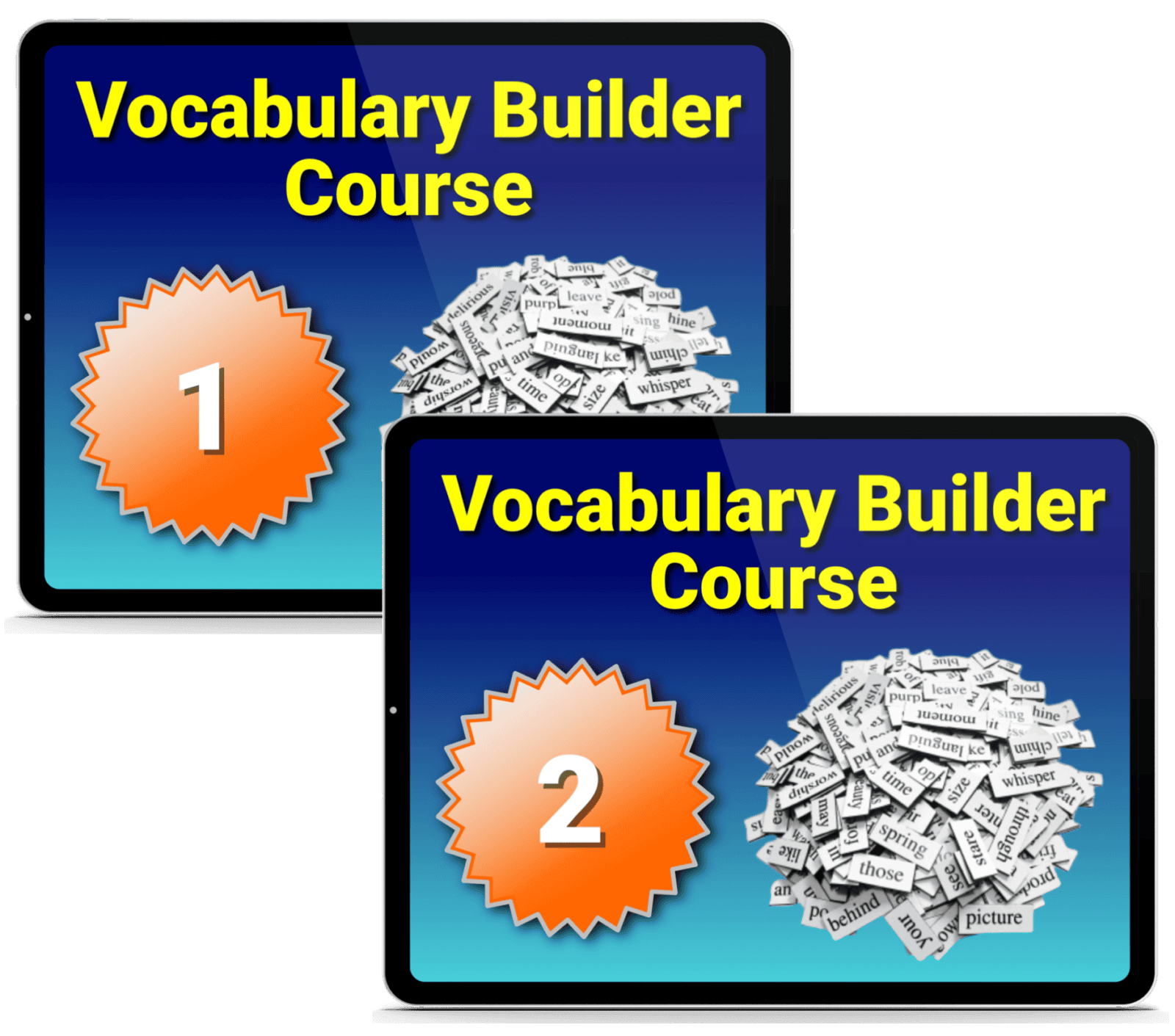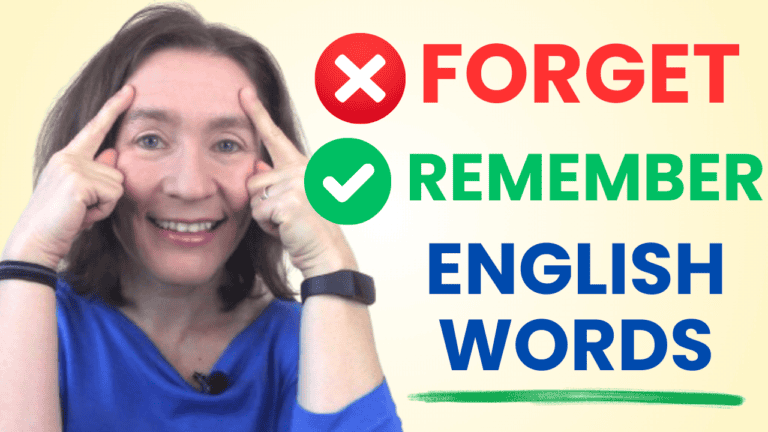
Learn strong verbs in English
Let’s replace weak verbs with stronger verbs! Each powerful verb in this list will improve your English vocabulary and fluency.
One of the most common problems I hear among students who are already at an intermediate level of English and who want to become more fluent – is that they really want to have a rich vocabulary. You don’t just want to use the same basic words over and over; you want to use interesting and powerful words.
So today I’ll teach you 20 interesting verbs that will supercharge your vocabulary. And that’s actually a good example – I could say “improve your vocabulary” or “expand your vocabulary” but those are weaker verbs than the word “supercharge.” This strong verb is so much more descriptive, it creates a mental picture of getting a huge boost in vocabulary power.
If you like this lesson, then you’ll probably love Level 2 of my Vocabulary Builder Course, which will teach you more than 1000 words that will really enrich your vocabulary.
If you’re interested in verbs, make sure to check out our lessons on action verbs vs. stative verbs, verb tenses, irregular verbs, and 100 common verbs in English.
OK, let’s get started – for each powerful verb I’ll tell you what it means and give you a few examples.
Strong verbs + Examples
blab
To blab has a couple meanings – it can mean simply to talk carelessly and without thinking, or it can mean to reveal something secret by talking carelessly.
If you’re separating from your husband or wife and you want to keep the details private, you’d be annoyed if your soon-to-be-ex-husband or wife blabbed about the situation on social media. They were talking carelessly and revealing secret or private information.
Or maybe there’s a company developing a new technology, and one of its employees blabs to the media – they revealed some secrets by talking without using caution.
clutch
To clutch means to hold something very tightly. Let’s say I hate roller coasters, well then if I go on one I would clutch the bar, I’d hold it very tightly, because I’m scared.

cower
Speaking of fear, the word cower means to shrink back and hesitate because of fear. This can be a physical action, like if a little child sees a big dog, he might cower by moving his body away and making it smaller; it’s body language that expresses fear.
Or it can mean something more like letting fear control you and failing to take action because you’re afraid. Maybe you’re working for a cause, trying to get a law changed in your country, but there’s a lot of opposition and resistance and obstacles. You could say “we won’t cower in the face of adversity,” meaning that even though people are against you, you refuse to let fear control you and stop your action.
crave
To crave means to have an intense desire for something.
We often use this for food – on a hot day, I might crave some ice cream; I really want it. But it can be used for strongly desiring other things, too. Maybe you crave your boss’s approval, or your kids crave your attention.

devour
Devour means to eat something quickly and greedily with a lot of desire. So if I was craving ice cream, and then I get some ice cream, I’d probably devour it.
You’ll also sometimes see this verb used for consuming or reading a book very quickly – I devoured the novel means I read it very quickly because it was SO good.
embrace
Embrace is another word for hug, so the physical action of putting your arms around someone. But it can also be used to mean fully accepting and welcoming an idea, a cause, a philosophy, and so on.
eradicate
To eradicate means to completely eliminate something, destroy it or get rid of it completely.
If your home is infested with insects, you’d want to call an exterminator to eradicate the insects. Some diseases that were very common in the past have been eradicated by vaccines. I hope someday we can eradicate poverty in the world, so nobody will be poor any more.
fling
If you fling something it means you throw it, often with a free and kind of uncontrolled motion.
You might fling some dirty clothes into the laundry basket, or fling some coins into a fountain. Maybe your young children are fighting and one of them flings a toy at his brother; he throws it freely and forcefully.

gaze
Gaze means to look in a steady and thoughtful way, often with wonder and admiration.
People often gaze at a beautiful landscape, or gaze at the stars in the sky. Or you might gaze at your boyfriend or girlfriend, admiring how great they look.
gravitate
To gravitate means to move toward someone or something, or be attracted to that thing, like it’s pulling you with some kind of power.
If you love science, you might gravitate toward science fiction movies – you tend to watch them instead of other types of movies. People would gravitate toward a leader who is very charming; they move toward him and go along with him.
groan
To groan is to make a sound of pain or annoyance, like uuunnhh.
An old man might groan when getting up out of a chair, because his joints ache, so he groans with discomfort. Your teenage daughter might groan when you tell her to get off her phone and clean her room; in this case she’s expressing annoyance because she doesn’t like your request.

mimic
To mimic means to imitate in appearance or behavior. Some animals or insects mimic things in nature, like a chameleon changes color to mimic its surroundings. If you’re learning a martial art, you would try to mimic your teacher’s movements, to imitate or copy them.
pinpoint
To pinpoint means to identify, usually not identifying a person but rather a problem or a reason or another piece of information. Let’s say you’re having back pain, your doctor would try to pinpoint exactly which nerve in your back is causing the pain.
revitalize
Revitalize means to bring in new life and new energy.
When the economy isn’t growing, the government might take action to try to revitalize it. Or maybe you have a city that is kind of boring, but then a new cultural center revitalizes the city center – it adds new energy and movement and life.

screech
A screech is a high-pitched sound that’s usually not pleasant to hear.
It can be made by a person – like a baby might screech if you take away its toy. Or it can be made by a thing, like if a car or train needs to stop very suddenly in an emergency, it might screech as the wheels rub against the road or track.
scrutinize
To scrutinize means to examine or inspect something very carefully, often looking for any mistakes or flaws. The workers at an important newspaper would scrutinize articles before publishing them, to make sure there are no typos, grammar mistakes, or errors in facts.

slam
Slam refers to a violent action with impact, like closing a door very forcefully or maybe slamming a book on a table if you’re angry. In sports like hockey and American football, the players often slam into each other.
There’s also a slang meaning – to slam something means to criticize it very harshly. Let’s say there’s a comedian who likes to tell racist jokes; people might slam that comedian – say extremely strong negative things to him and about him – because they hate those jokes.
soar
Soar means to fly high in the air; we might talk about a bird like an eagle soaring in the sky.
It can also mean to increase or improve suddenly – like how sales of face masks soared during coronavirus; there was a huge and sudden increase. Saying that your heart or spirit is soaring means that you’re feeling super great, almost like you’re flying.
treasure
You might know the word treasure as a noun, but it can also be a verb meaning to keep something precious and value it very highly.
It might not be something valuable in terms of money, but it’s very valuable and special to you. Like you might treasure a blanket that your grandmother made for you. Many parents say they treasure the time spent with their kids. It’s precious and dear to you.

yank
The verb yank means to pull something with a sudden and strong motion.
If your car door is stuck, you might yank it to try to get it open. If your child is wandering too close to a campfire, you might yank them back, pull them quickly to get them away from the danger.
Learn more: 100 synonyms to expand your vocabulary
You’ve learned 20 stronger verbs!
There you go – now you know 20 powerful verbs that you can use instead of the same old weak verbs. Make sure to practice these strong verbs by writing your own example sentences in English.
Practicing is so, so important because it helps you really remember English vocabulary better. That’s why every lesson inside my Vocabulary Builder Course includes a quiz and some short-answer questions to help you use these new English words yourself. Come join the courses if you’d like to level up your vocabulary even more.
That’s all for today – please let me know if you enjoyed this lesson on power verbs! Have a great day and I’ll talk to you next time.










